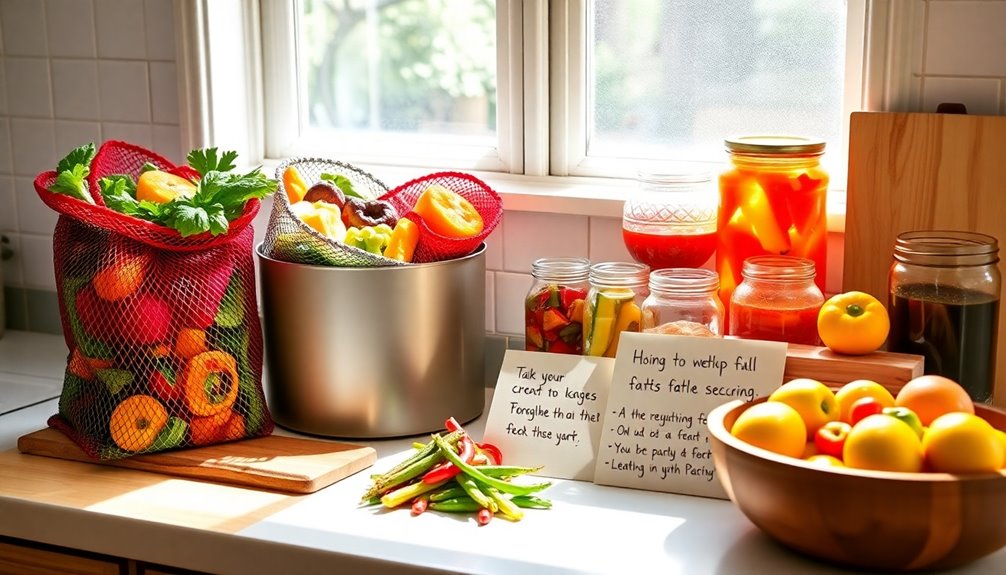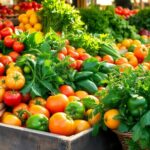To reduce food waste in your kitchen, start by meal planning and creating a shopping list based on your preferences. Store food properly by labeling containers and ensuring your fridge is at the right temperature. Understand expiration dates to know when food is still safe to consume. Get creative with leftovers by repurposing them into new dishes or adjusting portion sizes. Utilize your freezer for batch cooking and freezing meals that won't spoil. Finally, compost food scraps to minimize waste further and enrich your garden. There's plenty more you can do to enhance your food management strategies.
Key Takeaways
- Plan meals weekly to align grocery purchases with preferences, minimizing impulse buys and reducing waste.
- Utilize pantry items creatively and batch cook to control portions and extend ingredient life.
- Regularly check expiration dates and repurpose leftovers into new meals to avoid spoilage.
- Store food properly by labeling containers and monitoring fridge temperature to maintain freshness.
- Consider composting organic waste to create nutrient-rich soil while reducing landfill contributions.
Plan Your Meals Effectively
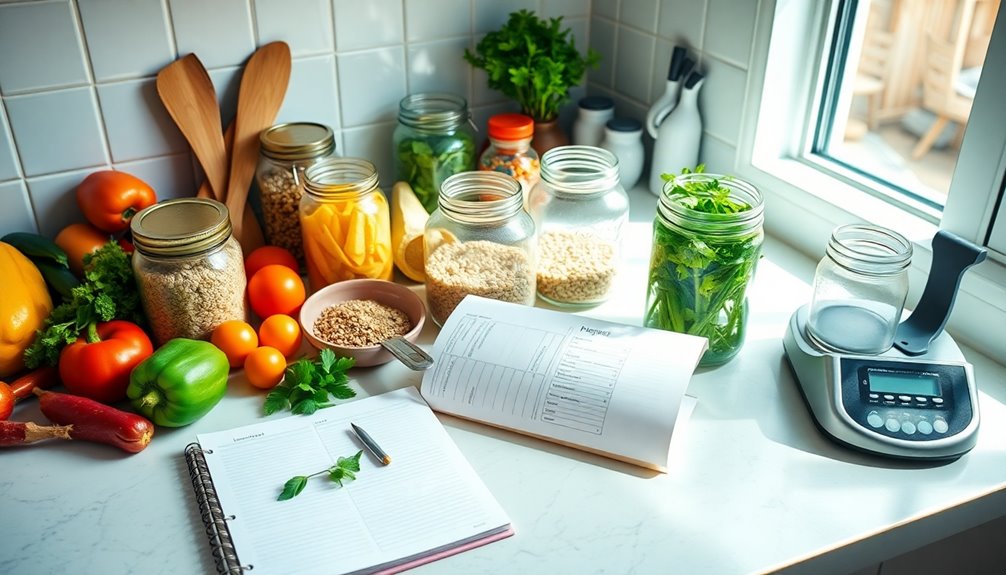
Meal planning is a powerful tool for reducing food waste in your kitchen. When you take the time to plan your meals effectively, you not only save money but also create a more sustainable cooking environment. Start by considering the meals you enjoy and how often you want to prepare them. This thought process will guide your meal prep and make it easier to stick to your plan.
Next, create a shopping list based on your meal ideas. A well-structured shopping list can prevent impulse buys and guarantee you only purchase what you need. Look at your pantry and fridge; using up ingredients you already have can minimize waste and inspire creativity in your cooking. By planning meals that complement one another, you'll also be able to repurpose ingredients, which helps in using everything you buy.
Additionally, consider batch cooking or preparing meals in advance. This strategy not only saves time during busy weekdays but also helps you control portion sizes, reducing the chances of leftover food going to waste. Incorporating mini band workouts into your routine can also provide a fun way to stay active while enjoying the meals you prepare.
When you know exactly what you'll be eating throughout the week, you can buy the right amounts, which leads to less spoilage.
Incorporating these practices into your routine fosters a sense of belonging within your community. You'll likely find that sharing meal ideas with friends or family can further enhance your meal planning efforts, creating a supportive environment that encourages everyone to reduce food waste together.
Understand Expiration Dates
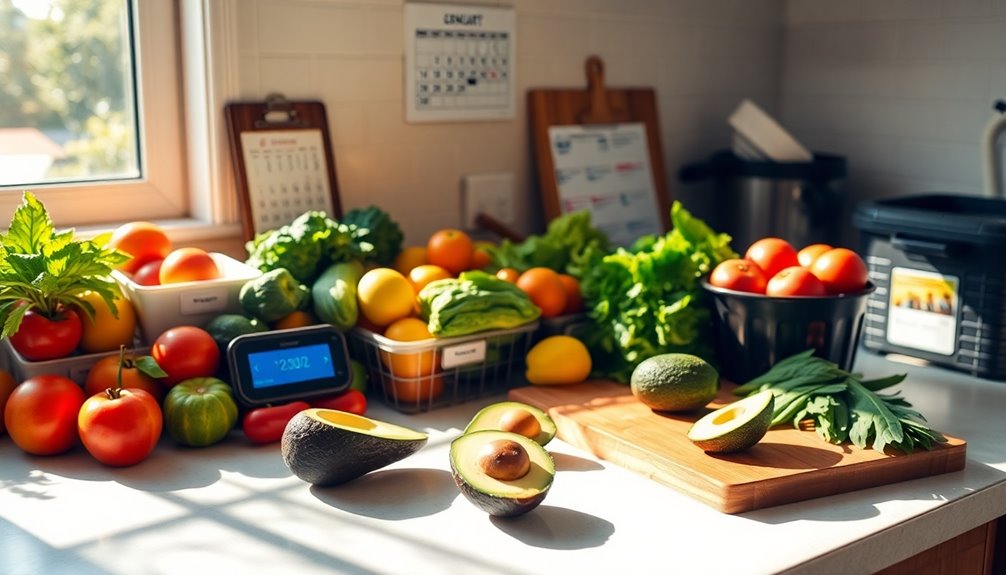
Knowing how to interpret expiration dates on food products is essential for minimizing waste in your kitchen. Understanding these labels can help you make informed decisions about food safety and freshness, ultimately reducing the amount of food you throw away. Let's break down the common terms you'll encounter:
| Expiration Date | Meaning |
|---|---|
| Best By | This indicates the quality, not safety. Food may still be good after this date, though flavor and texture might decline. |
| Use By | This date is more critical for food safety. It's best to consume products by this date to avoid potential health risks. |
| Sell By | This is mainly for retailers. It tells them when to sell the product, but you can often use the item beyond this date if stored properly. |
For effective label organization, check your pantry and fridge regularly. Rotate items based on these dates, placing newer products in the back and older ones in front. This practice not only aids in food safety but also encourages you to use items before they expire. Additionally, incorporating mindfulness practices can enhance your awareness of food freshness and reduce impulsive purchases that lead to waste.
Store Food Properly
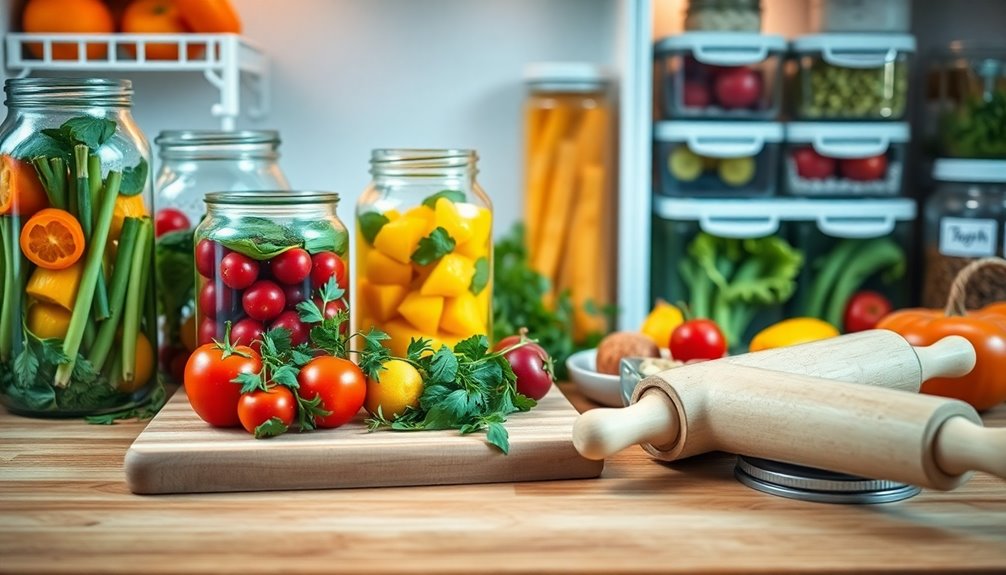
Storing food properly is crucial for extending its shelf life and maintaining quality, which directly impacts your kitchen's waste levels. When you take the time to organize and store your food, you not only reduce waste but also create a more efficient cooking environment.
First, always label containers with the contents and the date you stored them. This simple practice helps you keep track of what you have and when it needs to be used. By knowing how long food has been in your fridge or pantry, you can prioritize meals and avoid letting items go unused until they spoil.
Next, consider using reusable bags for items like fruits and vegetables. These bags not only help keep your produce fresh longer but also reduce your reliance on single-use plastics. Guarantee that you store these items in the appropriate sections of your refrigerator; for instance, keep leafy greens in the crisper drawer to maintain their crispness.
Furthermore, pay attention to temperature settings in your fridge. Keeping your refrigerator at the right temperature (ideally between 32°F and 40°F) can prevent spoilage. Store perishables towards the back, where it's coldest, and remember to keep the door closed as much as possible to maintain that temperature. Maintaining proper food storage practices is also vital in preventing CKD progression, as it can help ensure that you consume fresh, healthy foods that support kidney health.
Get Creative With Leftovers
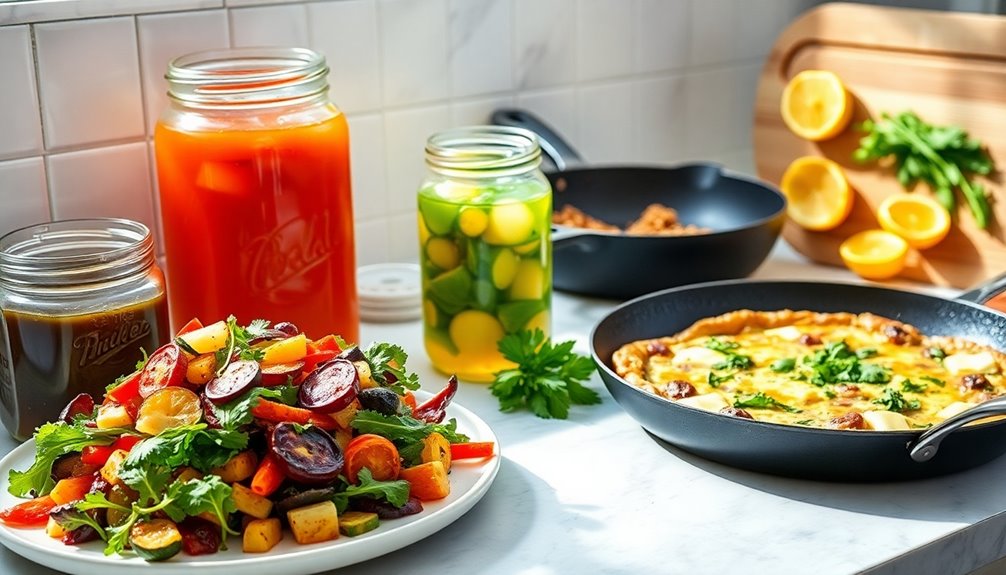
Even with proper storage, you might find yourself with leftovers that need attention. Instead of letting them languish in the fridge, consider how you can transform these bits and pieces into delicious new meals. Embracing creativity with leftovers not only reduces waste but also helps you practice portion control, ensuring you use what you have efficiently.
Start by brainstorming recipe ideas that can incorporate your leftovers. For instance, roasted vegetables can be easily tossed into a frittata or stirred into a soup. Cooked grains like rice or quinoa can serve as a base for a hearty salad or fried rice, and leftover proteins can easily be repurposed in wraps or tacos. The possibilities are endless when you let your imagination lead the way!
When planning your meals, think about how you can adjust your cooking habits to create less waste. By preparing smaller portions, you're more likely to eat what you've made and minimize leftovers.
However, when you do find yourself with extras, remember that they can be the foundation for tomorrow's creative dish. In fact, using leftover ingredients in new recipes aligns with the principles of a plant-based diet, promoting health and sustainability.
Document your favorite leftover recipes, and share them with friends or family. This not only fosters a sense of community but also encourages others to join in the effort to reduce food waste.
Use Your Freezer Wisely
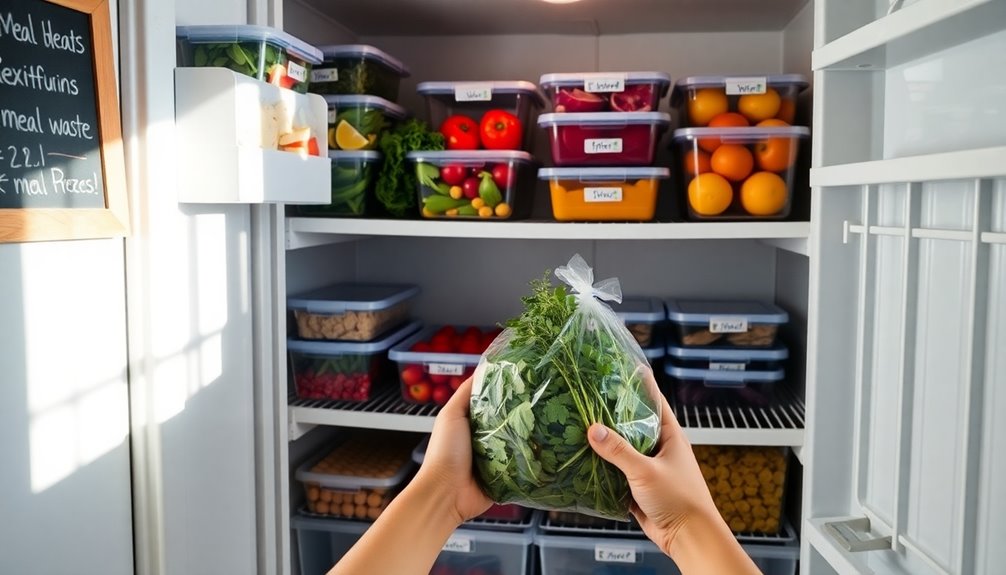
While many individuals consider their freezers as simple storage units, making good use of them can significantly reduce food waste. One effective approach is batch freezing. This method enables you to prepare large quantities of meals at one time, saving time and preventing excess ingredients from spoiling. By freezing these meals, you not only maintain their freshness but also create convenient options for hectic days.
When meal prepping, understanding what foods freeze well is crucial. Here's a practical guide to assist you in maximizing the potential of your freezer:
| Food Type | Freezing Recommendations | Shelf Life in Freezer |
|---|---|---|
| Soups & Stews | Ensure complete cooling before freezing. | 3-6 months |
| Cooked Grains | Divide into containers for easy access. | 1-2 months |
| Fruits | Clean, dry, and freeze in individual layers. | 6-12 months |
| Vegetables | Blanch prior to freezing to retain color and taste. | 8-12 months |
Additionally, incorporating meal prepping strategies can further enhance your food management efforts and reduce waste in your kitchen.
Compost Food Scraps
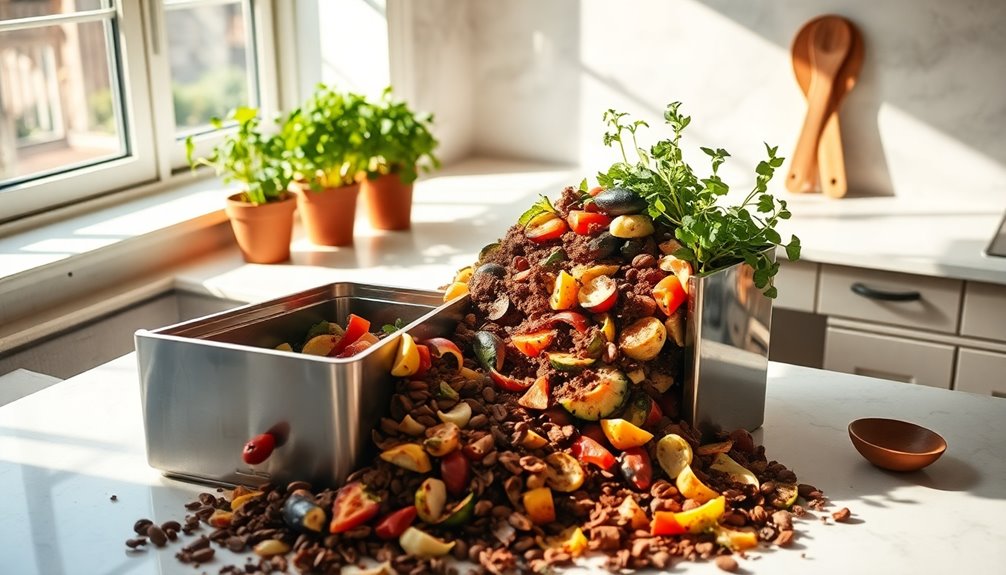
After you've maximized your freezer's potential, consider how to handle the food scraps that may still accumulate in your kitchen. Composting is a practical and rewarding solution for dealing with organic waste, and it aligns perfectly with your sustainability practices.
To start composting, designate a container for your kitchen scraps. This can be a simple bin, a bucket, or even a specialized compost pail. Fill it with vegetable peels, fruit cores, coffee grounds, and eggshells—items that would otherwise contribute to landfill waste. Make sure to keep it covered to minimize odors and pests.
Once your container is full, transfer the contents to an outdoor compost pile or a compost bin. Layering the organic waste with brown materials like dry leaves or cardboard helps balance the compost and speeds up decomposition.
If you don't have outdoor space, consider indoor composting options like vermicomposting, which uses worms to break down the waste. Composting not only reduces the amount of organic waste you generate but also creates nutrient-rich soil for your garden, which contributes to the overall environmental impact of reducing waste and promoting sustainability. By incorporating this practice, you become part of a collective effort towards environmental stewardship.
Joining a local composting community can further enhance your experience, offering support and shared knowledge. You'll find that taking these steps fosters a sense of belonging, as you contribute to a larger movement focused on sustainability and responsible living.
Frequently Asked Questions
How Can I Encourage My Family to Reduce Food Waste Together?
Imagine sitting around the table, laughter filling the air, as everyone shares their ideas for family meal planning.
You can engage your family in waste-free cooking by involving them in the planning process. Encourage each member to suggest meals they love, creating a sense of ownership.
Together, you'll discover creative ways to use leftovers and minimize waste, forging a deeper bond while making a positive impact on the planet.
Let's turn this into a family adventure!
What Are the Environmental Impacts of Food Waste?
Food waste greatly impacts the environment, contributing to climate change and resource depletion. When you throw away food, you're not just wasting the meal; you're also wasting the water, energy, and labor used to produce it. This waste adds to greenhouse gas emissions as decomposing food emits methane, a potent climate change contributor.
Are There Apps to Help Track Food Inventory?
In a world where food scarcity exists alongside abundance, technology solutions can bridge this gap.
You'll find several apps designed for effective inventory management, helping you track what you have and what you need.
These tools not only keep your kitchen organized but also foster a sense of community as you share tips with others.
How Can I Educate Children About Food Waste?
To educate children about food waste, you can engage them through school programs and interactive workshops that highlight the importance of reducing waste. Incorporate family activities and games that teach them how to use leftovers creatively. Set up challenges where they track their food usage, rewarding them for minimizing waste. This hands-on approach fosters understanding and encourages them to make responsible choices, creating a sense of community and shared responsibility in reducing food waste.
What Are Some Community Initiatives to Reduce Food Waste?
Imagine a world where nothing goes to waste. Community initiatives like food rescue programs and local community gardens can transform that vision into reality.
You can participate in cooking classes that teach meal planning to minimize leftovers and maximize flavor. By joining these efforts, you not only help reduce food waste but also foster a sense of belonging in your community.
Together, you can create a sustainable future, one meal at a time.
Conclusion
By implementing these strategies, you can transform your kitchen into a hub of sustainability rather than a source of waste. While it might seem easier to toss leftovers or ignore expiration dates, doing so only contributes to a larger problem. Instead, embracing meal planning and proper food storage not only saves you money but also nurtures the environment. With a little creativity and mindfulness, you can enjoy delicious meals today while preserving resources for tomorrow.

